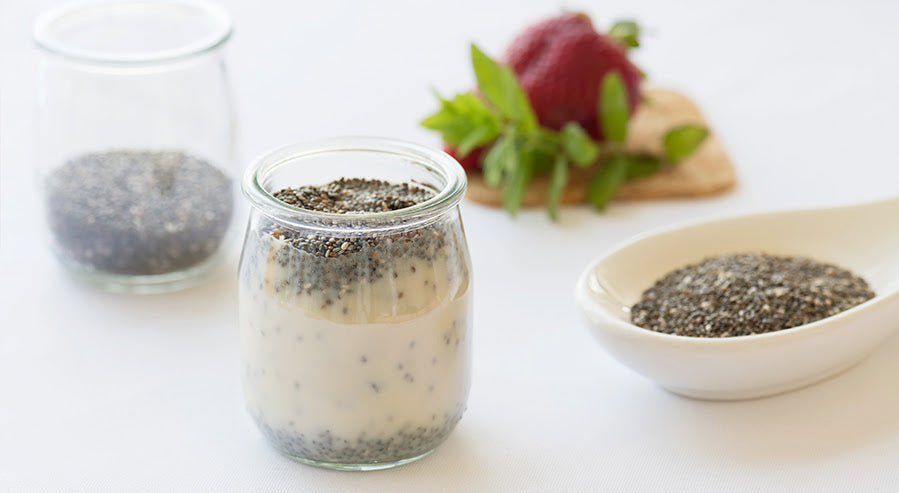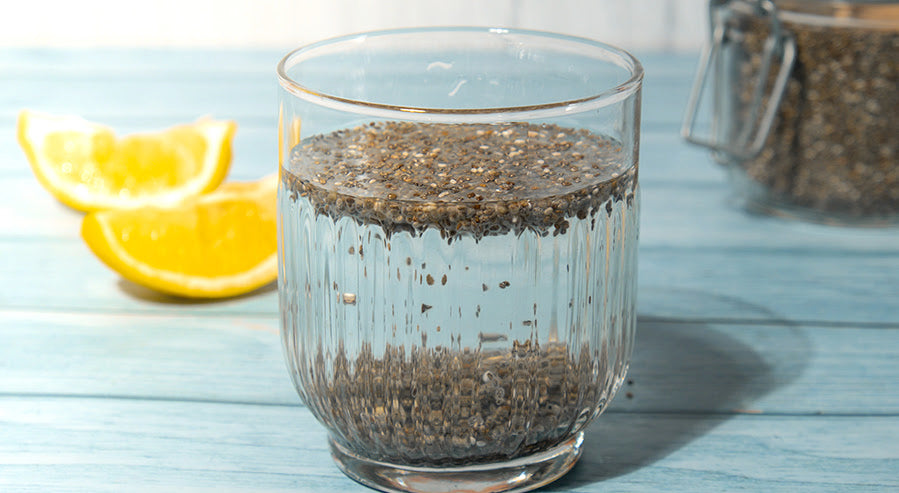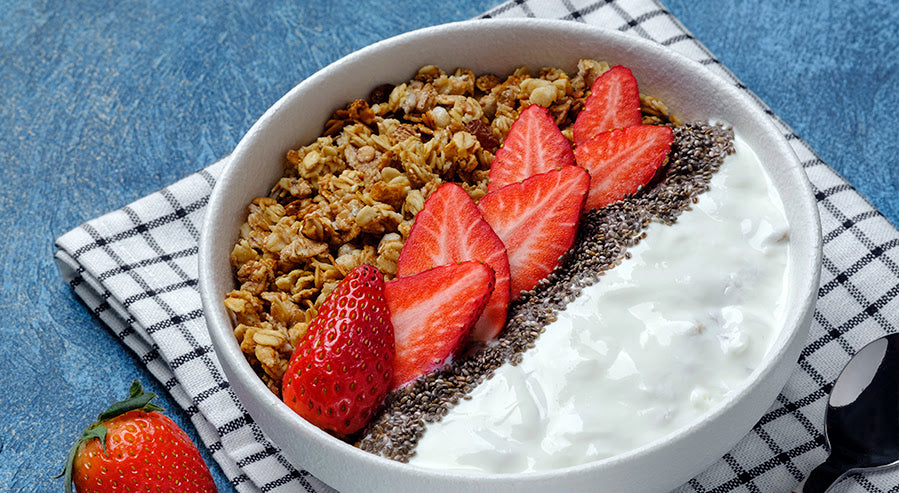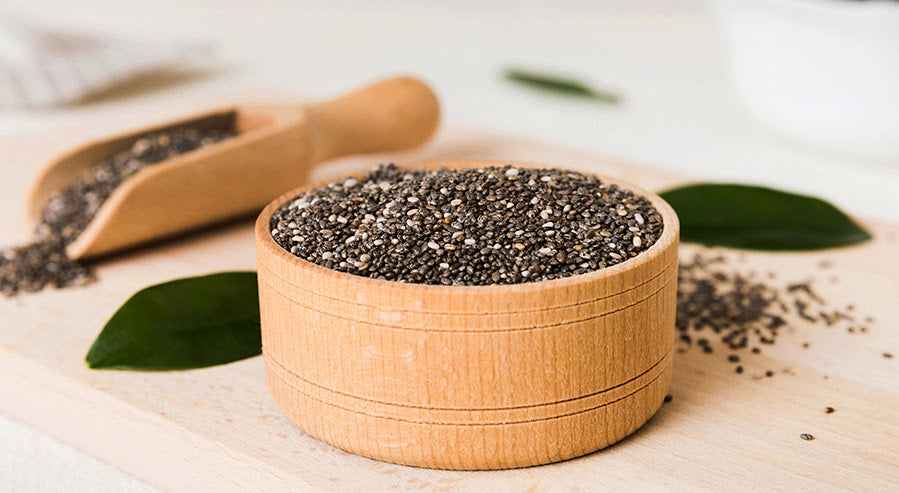Want a way to tackle that pesky, persistent bloat? Here's an idea; give chia seeds a whirl in your daily diet! These tiny champions are bursting with nutritional goodness, especially with a ton of fiber and a steep helping of omega-3 fatty acids.
Why did Chia Seeds shoot to fame, you ask? Well, it's thanks to their knack for easing bloating and giving your digestive health a leg up. I'm serving up the knowledge of how fiber and omega-3 fats work their magic on your gut health.
Whether you're a budding health guru or a chia seed pro, this guide's got something for you. And what's its goal? To lose light on the possible sinewy superpowers of these seeds, of course! Also, it shows how chia seeds could deflate your bloated belly and spruce up your gut health.
I'm here to dish out useful tips - all mixed in with the wisdom I've picked up along the way. I offer various suggestions for a holistic view. But hold up; keep in mind that changing what you eat can hit everyone a bit differently. So what's the takeaway? It might be a good idea to chat with a diet expert for advice that's tailored just for you. In my opinion, it's the best way to dig in!
The Fiber Content in Chia Seeds
You might want to know - what's the typical serving size of dried chia seeds? In most cases, it's around 2.5 tablespoons. Don't be fooled by their size; these tiny, mighty seeds pack in a solid 10 grams of dietary fiber per serving!
You can also go by weight. Something close to 28 grams, roughly an ounce, will get you just under two tablespoons. And guess what? The fiber content remains steadfast at 10 grams! Surprising, isn't it, that 35% of these tiny seeds' weight is fiber; that's a steep amount for such small seeds!
So, why should you care? Take a look at the Reference Daily Intake (RDI) guidelines; they show you the daily fiber targets. For ladies, you're looking at 25 grams; for gentlemen, your target is 38 grams.

Time for a bit of math! Adding chia seeds to your daily meals could really boost your fiber levels; it's like going the extra mile in a race, but it's only easy.
Chia seeds are like little fiber powerhouses; consistently eating two to 2.5 tablespoons of these fiber-filled treasures can cover about 35-40% of your daily fiber needs. Of course, the actual percentage might shift a bit depending on whether you're a man or a woman!
Remember this though - at the close of play, it's not in the numbers. These numbers are important, yes - but they aren't everything. You can't lay all your nutritional bets on chia seeds; Think of them as one part of the whole picture. A different, balanced diet is important to keeping your nutritional health buttoned down - in my opinion, there's basically no substitute for it!
The Power of Omega-3 Fatty Acids
Chia seeds offer a yummy way to squeeze in really important nutrients; they're a popular food choice for that reason. But be careful; possible nasties are linked primarily to their high absorption rate. When they meet moisture, these seeds grow really, and this might sometimes lead to bloating, constipation, or even bowel blockages. You see, people who already struggle with swallowing could have a hard time with this.
Here's my advice to get the best out of chia seeds and avoid the downsides: don't go eating dry chia seeds. Why, you ask? They can swell up in your throat if they touch moisture. And guess what? That's not going to feel good! I suggest, instead, pre-soak the chia seeds in a liquid or mix them into your wet recipes. Also, stick to the recommended daily amount of chia seeds; this rule stops possible tummy trouble from eating too much.

I have mixed feelings about the nutrient mix in chia seeds. On the one hand, it is mixed with medicines for conditions like diabetes and high blood pressure. How is this happening? Thanks to their rich omega-3 content, it could slow the sugar absorption in your blood. Suddenly, your diabetes prescription becomes super effective - the issue is it may be too effective! At the same time, these seedy guys are filled with fiber, which could affect how fast you absorb medications - not so good if you want your medication to work! Then there's the twist: Chia seeds could drop your blood pressure. While it sounds good, imagine combining that with blood pressure medication. You get it - blood pressure could plummet way too much. So, if you're on these specific medications, chat with a doctor before adding chia seeds to your meals.
So, chia seeds are nutritional powerhouses, sure, but their intake should be well-managed. You don't want to miss out on their great health benefits or meet with any nasty side effects. A few simple steps - like soaking these seeds properly and keeping your daily intake in check - can be great preventive measures, in my opinion.
Can Chia Seeds Improve Your Gut Health?
Do you know that fiber is a great friend of your gut health? The catch is that it really depends on the type of fiber. Let's talk about chia seeds - they work as prebiotics! Don't mix prebiotics up with probiotics. They're not the same at all; prebiotics aren't alive. They're specialized fibers from plants, doing the job of feeding friendly bacteria in your large intestine. So what do they really do? These prebiotic fibers will create a great space for the most useful bacteria to grow.
The thing about chia seeds? They're fantastic at this - they help balance your gut microbiome. Friendly bacteria love it! They flourish, multiply, and show the harmful ones the door. This balance is the secret to great gut health; it can also help with unpleasant things like bloating.
Protecting the diversity in your gut, along with an increase in helpful bacteria, strengthens the gut barrier. How does this benefit you? It can reduce inflammation by stopping harmful things from getting into your body. The outcome? Less inflammation, a smooth-running digestive system, and bloating become a minor issue. To cash in on these benefits, just start adding chia seeds to your meals.

Why does keeping this balance matter? A balanced gut - now that's gutless, it is likely to face issues like bacterial overgrowths, like SIBO (small intestinal bacterial overgrowth), which is known for causing bloating. Over time, the useful nutrients from chia seeds can make your gut microbiome stronger and more different. This means fewer episodes of bloating and fewer gut issues to deal with.
Alright - let me clarify: Chia seeds alone won't solve all your gut troubles. But - and this is important - they can help quite a bit. Each teaspoon of these little nutrition bombs benefits your gut health. In my opinion, it's mind-blowing how these small changes to your diet can make such a big difference to your digestive health. Just remember, a balanced inside means a balanced gut!
How to Properly Eat Chia Seeds
Did you know chia seeds can actually expand to 10-12 times their original weight when dunked in water? It's pretty resourceful to remember this, especially when figuring out the right way to enjoy them; planned prudently, you can skip that annoying bloated feeling. If you think about adding chia seeds to your meals every day, it means getting strategic with your meal plan. Be careful - you don't want to overdo it straight off the bat and mess with your stomach because chia seeds (pretty much like any other high-fiber food) can mess with your digestion if taken in excess.
So what's my tip for you? Start easy - work them into your meals slowly. How about kicking off with a teaspoon each day? Such a slow-and-steady technique gives your digestive system a fair chance to get used to the jump in fiber. As time goes by, you can gradually boost this part, maybe until you're at a sweet spot of 2 tablespoons daily. Why the slow increase? Well, it helps mix chia seeds into your meals without a hitch.

You should know this - when it comes to adding fiber-packed foods like chia seeds to your diet, it's in staying hydrated. Only if you're properly hydrated can your body break down and make good use of that fiber. So, keeping this in mind, make sure you're drinking enough; maybe around eight glasses of water every day should do when you're throwing chia seeds into the mix.
Here's another little something I recommend - you should lay off munching on dry chia seeds. What's up with that? Well, they can bunch up into a jelly-like clump that could block your gut or even your food pipe in worse scenarios. Soaking the chia seeds in water for about 15 to 20 minutes first lets them swell up to their maximum size - you save yourself from possible trouble this way.
Ways to Add Chia Seeds to Your Diet
So, you're thinking about adding chia seeds to your diet? These tiny grains are nutrient powerhouses; they can be easily slipped into your daily meals. Start your day off right; add some chia seeds - high in fiber! - to your breakfast cereal or yogurt. It's a small change, but the health benefits are really impressive!

Why not boost your morning drink by popping in some chia seeds? Even your toast can cash in on chia seeds' health benefits. Pair them with berries to whip up a jam loaded with nutrients! It's a health-boosting spread that doesn't need any extra pectin - chia seeds have a knack for soaking up and holding onto fruit juice.
So, what about lunch? Add chia seeds to your salads and you're both improving the fiber content; you're adding an interesting texture, too. Thinking about putting chia in salad dressing? It adds visual appeal and gives a rich, low-calorie texture thanks to the seeds' natural thickening properties.
Baking? Chia seeds can handle that, too. Mix chia seed powder with water, and boom; you've got an impressive vegan substitute for eggs. If you have a sweet tooth, give chia pudding a shot. It's a tasty and nutrient-packed dessert that turns silky when combined with your favorite milk. Top it off with some of your favorite fruit and a drizzle of honey.
To sum things up, Sprinkling chia seeds onto your meals is a simple way to boost your nutrition without compromising on taste. Remember, though - while chia seeds can amp up the nutritional value of your food, balance is important. A healthy lifestyle and diet are still really important. Why not sprinkle some chia seeds on your next meal? I think you'll be pleasantly surprised by your decision.
Finding The Perfect Blend
Chia seeds are tiny but rich in health benefits; in fact, they're loaded with fiber and Omega-3 fatty acids. They support digestion, slash inflammation, and boost gut health. Also, they're great for tackling bloating. But be careful! You have to eat them in moderation and keep yourself well-hydrated to avoid tummy troubles.
Thinking of adding these seeds to your meals? Here's an easy trick: start with small amounts, up your water intake, then gradually increase the chia. This technique helps your digestive system adjust and lets you get the most health benefits - but when to start is your call.

If you're finding it difficult to add these healthful seeds into your diet, Teami can step in to give a hand. We have teas tailored to what you need - want to lose weight, sleep better, or boost your immune system? We got you! Also, we don't stop at teas; we have products to make your skin look fantastic and boost your inner glow. Shopping around our online store, you'll see tons of options perfect for your wellness process.
So, chia seeds might be small, but including them in your diet - even small amounts - can do wonders for your digestive health. As your advisor and champion of health balance, I'd say take some time to look at various Teami options to kick your health up a notch. Just remember - balance is important to a healthier lifestyle!